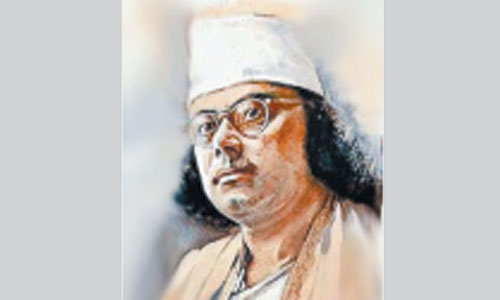Nazrul’s death anniv today
The nation will observe the 40th death anniversary of National Poet Kazi Nazrul Islam today.
Socio-cultural organisations, television channels and radio stations have planned elaborate programmes to observe the day.
The day’s programme will begin with placing wreaths at the poet’s tomb beside Dhaka University Central Mosque in the morning.
Nazrul Institute has organised a two-day programme that began on Friday at the Institute where CDs featuring 500 Nazrul songs in its original tunes were launched, besides discussion and a cultural show.
Today, the institute will observe the day through conferring Nazrul Award 2015, discussion and cultural show at the main auditorium of Bangladesh National Museum.
Nazrul Academy has taken up a three-day programme that began on Friday at the academy complex at Mogbazar in the capital.
Bangladesh Shilpakala Academy will hold a special programme featuring cultural show and discussion at National Theatre Hall of the academy on the occasion.
Bangla Academy will hold a programme tomorrow at Shamsur Rahman Hall of the academy to observe the day.
On the occasion, president Abdul Hamid and prime minister Sheikh Hasina in separate statements conveyed their honour to the poet and prayed for his departed soul.
Kazi Nazrul Islam (1899–1976), known as the rebel poet, contributed to almost all genres of literature in his career.
In his short artistic career of just over 20 years, before be lost his speech, Nazrul penned 3,174 songs, 600 poems, three novels and 43 essays, according to Nazrul Institute.
Born into a poor family on May 24, 1899 or 11th Jaishthya, 1306 in village Churulia under Asansol of Burdwan in India’s West Bengal, Nazrul had to leave his study at an early age for earning his living.
At nine, he had to join a Churulia-based professional leto troupe to earn his livelihood. While working for the troupe, he was introduced to works of Bangla and Sanskrit literature. A year later, he resumed education and got enrolled into Matharun English School but dropped out from Class VI for poverty.
This time, he worked with a Kabi Gaan troupe and subsequently took up a job at a bakery shop. At this stage of his life, Nazrul started writing poems and his talent soon grabbed the attention of a police officer named Kazi Rafizullah, who gave him shelter in his house at Trishal in Mymensingh in 1914, and enrolled him in Class VII at the Darirampur School.
In 1917, Nazrul joined the British Army as a soldier. While serving the army, for two years and a half, the young poet was introduced to Persian literature and learned to play different instruments and music following notation.
During his tenure as a soldier, Nazrul’s literary practice took a formal shape: his first poem Mukti, first story Bounduler Atmakahini, and a number of other writings such as Byathar Dan and Meher Nigar were published in this period.
From 1920, Nazrul got himself totally into literature writing in abundance. Many of his famous poems appeared during this time. In 1922, Nazrul started a fortnightly named Dhumketu.
For his political poem Anondomoyeer Agomone, Nazrul was sentenced to a one-year jail term. While in prison, the poet wrote his masterpieces Aji Srishti Sukher Ullase, Abhishap, Jater Namey Bajjati, Bhangar Gaan and Shikal Para Chhal.
In his creative life, Nazrul also worked as a music composer for popular music brand HMV (His Master’s Voice). He acted in a film, Bhokto Dhrubo, for which he also penned, composed and directed the music. Nazrul also worked for another film, Patalpuri (1935), as a music director. He joined the All India Radio Kolkata sometime between 1938 and 1939.
In 1972, an ailing Nazrul was brought with state honours to Bangladesh. He was awarded Ekushey Padak in 1976.
Nazrul died in Dhaka on August 29, 1976 (the 12th Bhadra of Bangla calendar).
News Courtesy: www.newagebd.net











